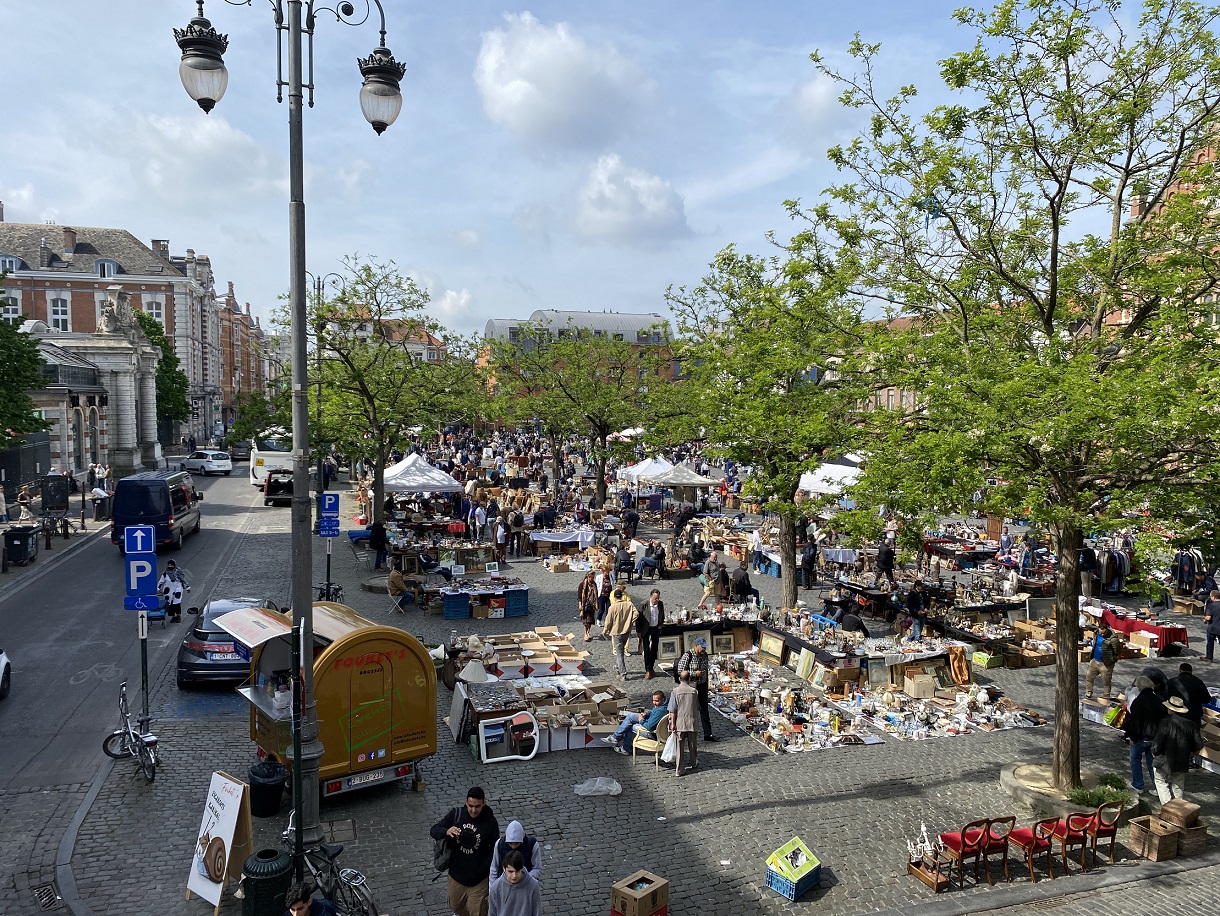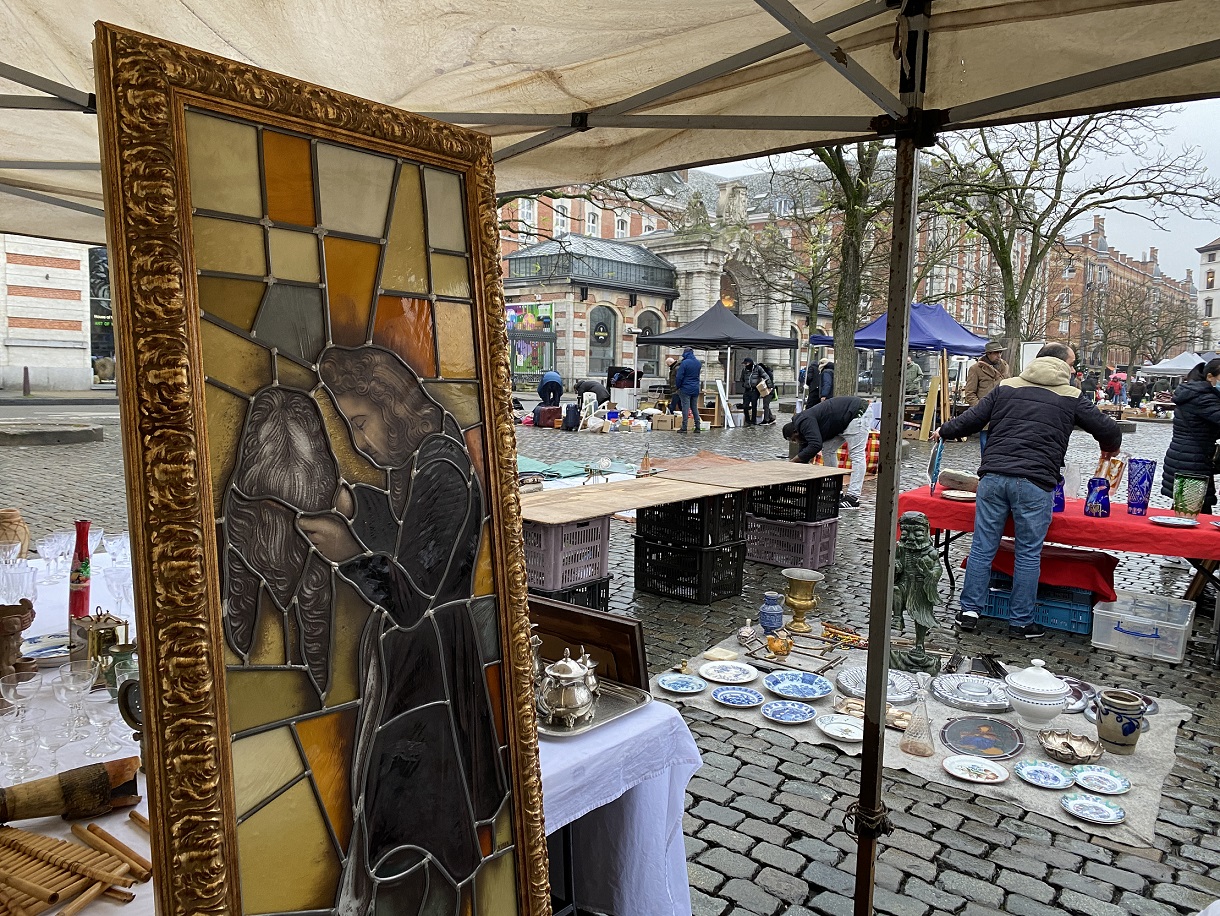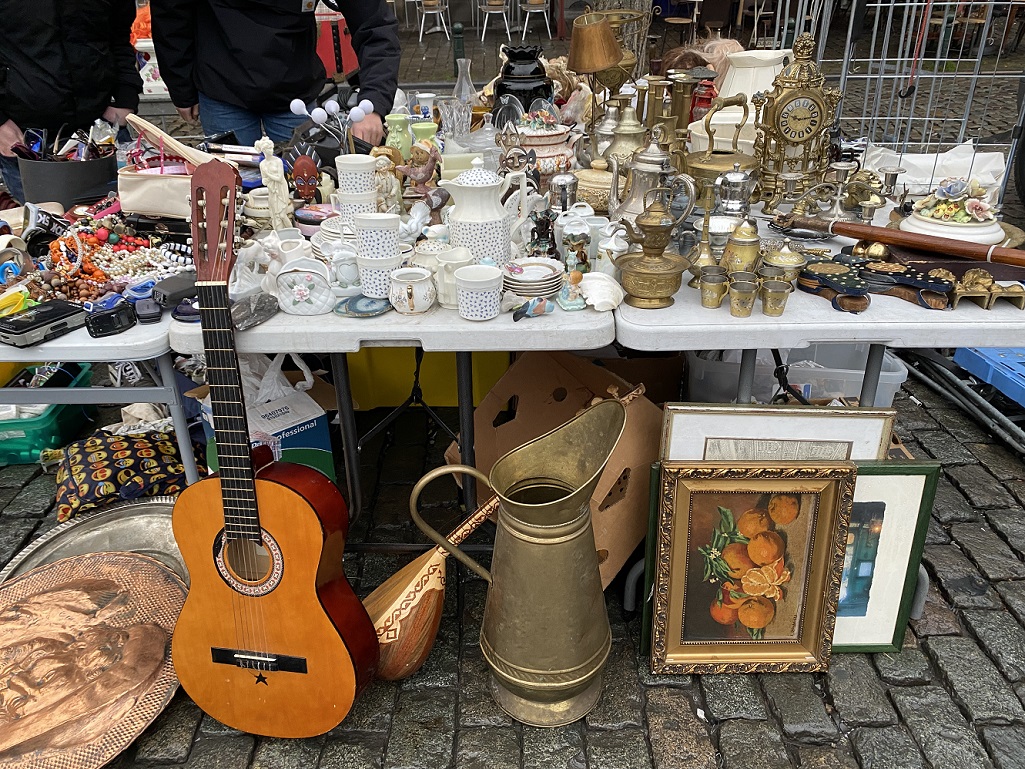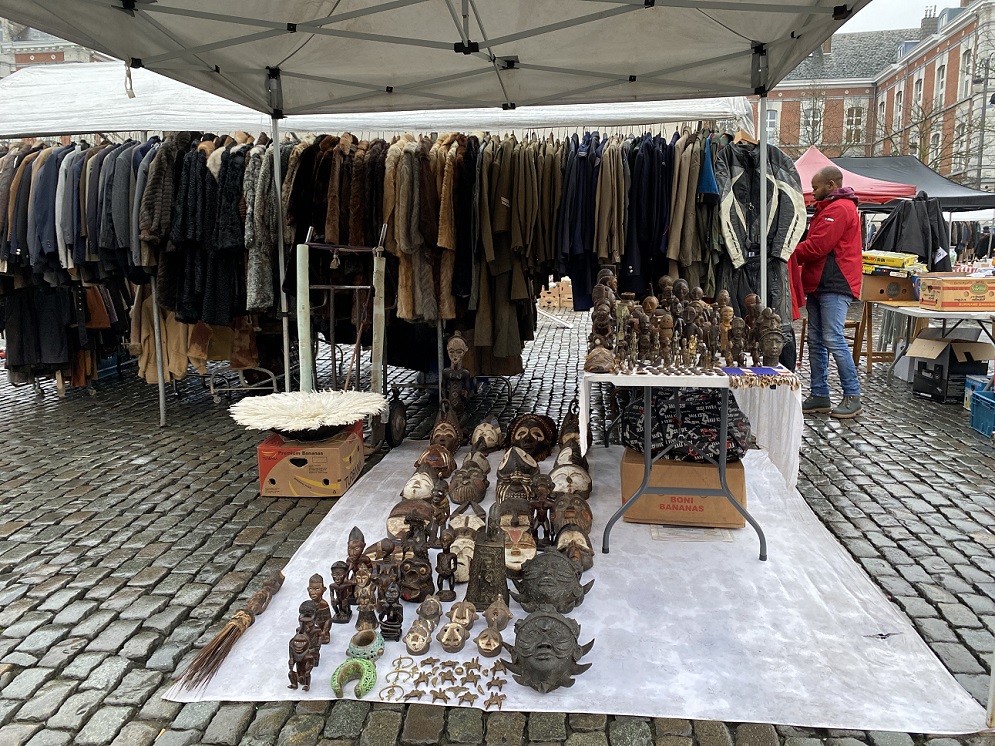You can find anything there from a grandfather clock to silver cutlery, from a plastic doll to an African face mask.
“The market sustains thousands of people. Not just vendors, but visitors too,” says Anass, as he peers at me with his one straight eye. “Without the market, they couldn’t feel at peace.”
Anass is a regular visitor at the flea market at Place du Jeu de Balle in the heart of Brussels. He is standing at the other end of a table holding Disney watches, porcelain figurines, ashtrays, baubles, and metal tools for hobbyist torturers. Around us, a loose mishmash of individuals stumble, eyes spiralling as they take in the market’s wares. “It has a therapeutic component too,” Anass continues. He laughs. “Maybe that’s 40 percent of it.”
Vintage shops line the streets of Les Marolles, the kookiest neighbourhood in Brussels. They are crammed with exquisite mid-century furniture, Flemish oil paintings, Congolese statues and more, suited to every budget and taste.
But the quarter’s indisputable soul is the Jeu de Balle flea market. The only market of its kind in Belgium, open four days a week, the historic spot is even immortalised in the pages of Tintin (The Secret of the Unicorn for the geeks out there).
The square’s French name comes from the ball game (petanque) popular in the 19th century, while its Flemish name, Vossenplein (Foxes Square) testifies to the Renard locomotive plant that once stood here, in a linguistic crossover common to these parts.
After the factory’s demolition, half the vacated space became a fire station, half became this square. Brussels in the 19th century underwent a makeover and officials felt its new boulevards were messed up by the old market at Place Anneessens, so they moved the entire thing here.
That was in 1873. Nearly 150 years later, Anass is one of many visitors who know what they’re looking for. A restaurateur, he comes to buy up old fridges, freezers, and other appliances to send back home as donations to Cameroon, where people can’t afford them. “With a fridge-freezer people can make ice cubes, yoghurt,” he explains. “Just one fridge can sustain one or two families.”
Resell rights
At a high table between two stalls, over plastic cups of coffee and cigarettes, I interrupt two vendors bantering. “You can’t live with this situation,” the smaller, greyer one tells me. “It’s dead, dead, dead.” His taller, younger colleague adds, “You pay the market fees from your pocket just so you can return home with nothing.”
Market fees per day are €12 per square metre, but most people need more space, meaning €36, €48 or more. There are also costs for trucks, fuel, taxes, and other expenses to factor in. The two guys tell me that selling €100 in a day might leave you with €40 in the pocket.
Arrais is more upbeat. He is a hardcore market trader, constantly making sales. He pays €240 per month, on a prepaid subscription basis. He eschews tables and racks in favour of a grid of boxes on the ground. Weekday buyers pick through at a steady rate, like lanky birds of prey inspecting a carcass.
Somehow Arrais talks with me while simultaneously counting out change for at least three sales during our seven-minute chat. “Is it hard to pay the subscription?” I ask him. “That’s why we work,” he says. “To have a shop you’d pay a lot more.”
A lady approaches with a stack of plates. “€8,” he tells her. Then to me, “See the madam, she’s buying the plates here and will resell elsewhere.” She points out a small crack on one plate. “€7, that’s it,” he says. She assents with no word nor gesture, packing the bounty into a trolley. “Is madam going to sell the plates elsewhere?” I ask her. “Maybe,” she responds and trundles off.
What’s the most expensive thing you’ve sold? Arrais hmms and gives a faraway look. “Not more than €500.” What was that? “It was a long time ago. A painting like that.” He waves at one of countless in view.
The two neighbours baulk at my question. “There’s no such thing as a most expensive item here,” says one. “We just get peanuts here,” says the other. “But as we say, we make bread with it.”
One guy, a cheery Moroccan who keeps a stall with his brother, just sold a lamp to a vendor across the square. “There are days I sell, and days I buy,” he muses. “It’s like that, it rolls around. Like a cassette.”
A life laid out
Most stuff here comes from “vide maison” (house emptying). Sometimes, it’s people moving away, perhaps a European Commission official taking away her prized pieces and leaving the rest. Other times someone has died, resulting in the strange spectacle of a whole life laid out on a blanket in the square.
Old photos, postcards, coffee sets, a candlestick. Objects endowed with unknowable stories, now exposed out of context. Naked. “Isn’t it sad,” I ask the cheery Moroccan, “seeing the whole life of someone who’s passed away?” “It’s normal,” he replies. “Normal.”
When a home needs emptying, people search online, call numbers and dudes turn up with trucks. Sometimes they pay for the goods, sometimes they get them for free. Sometimes it’s done by lots, and you don’t know what’s in your crates.
A daily lottery, but with losers. There’s a booby prize: throwing stuff away costs money. I’m told €55 per cubic metre, making about €600 to empty a truck. The gamble gets steeper. “I must have made mistakes,” says Hafied. He runs a stall jammed with bric-a-brac, table decorations, paintings and such under a canopy at the corner marked by the Marseillais bar where people drink pastis and eat sardine sandwiches. “I must have sold valuable things for too cheap.”
You might not know the true value. But others do, and they will pounce. “They know what they are looking for. They come precisely for paintings, vases, knives, or clothing. You could offer them the rest for free and they wouldn’t take it,” Hafied says.
Market tales
I hear stories. In 2019 a man bought ten vinyl records here for €50 and later sold them for €5,000. Another bought some cheap postcards and cashed in for €10,000. I walk past an old man rifling through postcards and wonder. Savant or chancer?
To my untrained eye, identities blend in the market. The most represented origin among vendors is Moroccan, followed by Algerian. There are people of Belgian descendance, less keen to talk to me. Spanish. An Italian or two. There’s talk of Brazilians.
Sherif says he’s one of four Tunisians. He is shaggy, laconic and downbeat but also charming and friendly, tending a small stall with lamps and other pieces. For 30 years he’s been officially Belgian. “But honestly, he says, “nobody ever made me feel like I’m Belgian.”
Belgium’s colonial history in Central Africa is also on display, with a few stalls selling African masks. The sellers are uniformly uninterested in answering my questions. The masks are immaculately lined up, some uncanny, some noble, some inspiring, some terrifying. All silent.
How long will the market last? One vendor says he doesn’t see it enduring more than five years. An older grey chap of Moroccan origin leans forward in a folding chair. He started selling here after he retired. “It’s my pension.”
He sees a societal role for the market. “The market is an attraction for everyone, to look even if you don’t buy. Sometimes you fall in love with something and buy. That’s the market.” For a moment his demeanour changes, there’s a sparkle in his eyes. “When you speak of the market, you talk of discovering something that you don’t see every day.”
There is an ease to these men, and they are mostly men, talking and interacting, buying, selling goods, giving them new life, making up prices on the spot, discussing, negotiating, seeing what’s possible. It feels hard, but creative, free and productive.
Do you like the job? Hafied talks to me while scanning the horizon. “I’m free, I’m independent, nobody comes to tell me I’m not working,” he responds. “I’m my own boss. That’s it. And now I have to empty the truck.” With thanks, he is gone, surely to return.
Market forces
The flea market has such random wares that prices are mostly arbitrary. Go in with the right technique and set the agenda. Here are six kinds of object you'll always find there.
- Art. You might not discover any works by Belgian romantic artist Antoine Wiertz, who painted in the abandoned locomotive factory that stood here before the square was cleared. But oil paintings, watercolours, stained glass creations, and collages abound, featuring mysterious nudes, bucolic country scenes, and the like. Just check well for weather damage.
- Electrics. Feel like rewinding to cassettes? The market will oblige, also offering assorted amps, record players, ancient hi-fis and so on. Some generators around might allow you to plug them in to test – otherwise bargain way down if not sure it’ll work. Cables tend to go surprisingly fast and can be picked up for next to nothing.
- Furniture. Chairs, tables, hat stands: you can find it all. But for the good stuff here, it’s worth getting up and coming down early on a weekday. The market opens at 7am when professionals pass by scouring stalls for the gems. Plenty of the wares emerge from emptied apartments, so lovely pieces can reward the early scavengers.
- Musical instruments. A few guitars are typically knocking about, but quality varies wildly. This writer once picked up a mini guitar with a strap for just €5, but more respectable axes will set you back more. Flutes, accordions and more have been seen – just make sure to give them a whirl first.
- Masks. Masks have been made in Africa since prehistoric times: those on sale here might cover face, head, or torso, depicting animals, humans, spirits, and more. Traditional masks might have been used to dress corpses, for religious rituals, and for other purposes lost to time. These vendors tend to specialise, so don’t expect to carry one off too cheaply.




